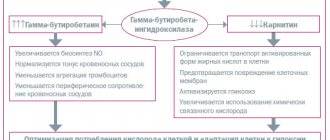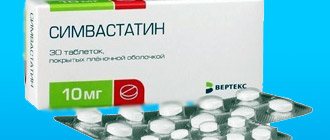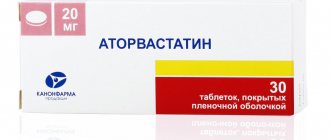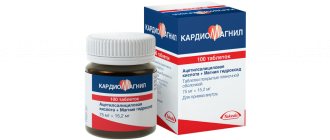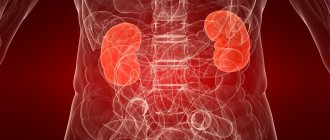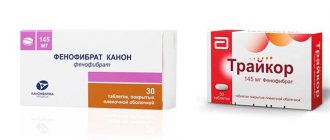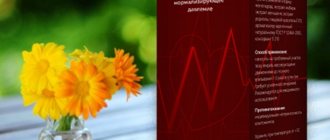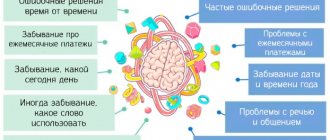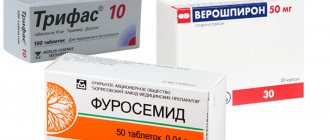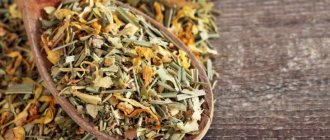Prohibited during pregnancy
Prohibited during breastfeeding
Prohibited for children
Has restrictions for older people
Has limitations for liver problems
Has limitations for kidney problems
In the modern world, heart disease leads in the number of deaths. Cardiomagnyl is a combined medication (acetylsalicylic acid + magnesium) that prevents the development of acute coronary syndrome, leading to cerebral and cardiac infarction. The medicine is used in neurology and cardiology. The cost of the drug is quite high, so there is often a need to look for cheaper analogues of Cardiomagnyl.
General information about the drug
Cardiomagnyl is a combination drug with magnesium and salicylic acid. The drug prevents the process of thrombus formation due to the inhibition of CTC-1 and the effect on thromboxane 2 molecules. The drug also reduces pain and inflammation and affects thermoregulation receptors. Magnesium in the tablets protects the ECT mucosa and replenishes the lack of magnesium ions in the myocardium.
Cardiomagnyl is prescribed for therapy:
- heart failure;
- thrombosis;
- hypertension;
- after surgery on the coronary arteries;
- angina pectoris.
Thrombosis
Cardiomagnyl is often the main medication in complex therapy after ischemic stroke and myocardial infarction, as well as a means for secondary prevention of these pathologies and coronary insufficiency.
Cardiomagnyl is often prescribed to patients with the following pathologies:
- hypercholesterolemia and obesity;
- hypertonic disease;
- systemic atherosclerosis;
- diabetes;
- physical inactivity, alcohol and nicotine addiction.
- for men it is prescribed after the age of 45-50 years, for women - during menopause.
Diabetes
Cardiomagnyl should not be prescribed for:
- cerebral hemorrhages, hemorrhagic diathesis and thrombocytopenia;
- bronchial asthma, bleeding in the digestive tract;
- pregnancy, breastfeeding and under 18 years of age;
- aspirin triad and renal failure.
For the treatment and prevention of heart pathologies, it is necessary to take the medicine in a therapeutic dosage - 75-100 mg. The procedure for taking medication should not depend on food intake.
Cheaper Russian synonyms
Russian analogues of Cardiomagnyl are 2 or even 3 times cheaper, but this does not affect their effectiveness. Most patients choose Russian-made substitutes for long-term therapeutic or preventive courses.
Acecardole
Acecardol is a non-steroidal anti-inflammatory drug based on acetylsalicylic acid. The mechanism of action of the active component is aimed at inhibiting COX-1, which blocks the synthesis of thromboxane A2 and prevents the aggregation of platelet molecules. Daily dosage – from 100 to 300 mg (1-3 tablets).
The drug is prescribed for the following pathologies and as a basis for the prevention of heart pathologies:
- primary and secondary prevention of heart attack and stroke;
- thromboembolism due to cardiac arrhythmia;
hyperlipidemia;- hypertonic disease;
- diabetes;
- vein thrombosis;
- varicose veins;
- obesity;
- unstable angina;
- therapy and prevention of unstable cerebral blood flow;
- after surgery on veins and arteries (coronary artery bypass surgery, angioplasty, removal of venous nodes for varicose veins).
Contraindications to the use of Acecardol are:
- allergies to components;
- bleeding in the active phase;
- ulcers in the gastrointestinal tract;
- aspirin triad and asthma;
- oncological neoplasms;
- hemorrhagic diathesis;
- pregnancy and lactation;
- age until adulthood.
Cardi ASK
Cardi ASA is an antiplatelet agent with acetylsalicylic acid, which blocks the aggregation of platelets in the blood plasma. The drug is also an anti-inflammatory drug that can be taken at the first sign of a cold. The antiplatelet effect after taking a single dose lasts up to 1 week.
The drug is prescribed for prevention, as well as as part of complex therapy and prevention of such vascular pathologies and myocardial diseases:
heart attack;- thromboembolism after coronary artery bypass surgery;
- hypercholesterolemia, diabetes mellitus and hypertension;
- systemic atherosclerosis and thrombosis;
- diabetes and obesity;
- angina pectoris;
- disturbance in cerebral and peripheral blood flow;
- pathologies of the venous system.
The medicine is not prescribed for those with allergies to components, as well as for children under 18 years of age, pregnant and lactating women. It is prescribed with caution for bleeding pathologies in the digestive tract (erosions, ulcers). The medicine is not prescribed for renal and liver failure and hemorrhagic diathesis.
The medication is prescribed for long-term use in the treatment of pathologies, as well as for the prevention of repeated heart attacks, coronary syndrome and stroke. The drug must be taken daily before meals, 100-200 mg, or taken every other day, 300 mg. The dosage and regimen for taking the medicine must be prescribed by a doctor.
Aspirin Cardio
Aspirin Cardio is an aspirin-based antiplatelet agent (ASA). The tablets are in a coating that does not irritate the gastric mucosa. The drug dissolves in the intestines, and absorption occurs there. The drug is metabolized in liver cells. The medication is prescribed primarily for the treatment of cardiac pathologies, as well as in case of disturbances in the blood flow, which leads to an increase in the process of thrombus formation in the blood plasma.
The medicine is used as a prophylactic agent to prevent the progression of such cardiac pathologies:
- angina pectoris;
- myocardial ischemia and infarction;
- postoperative period after interventions on heart valves or coronary arteries.
Mechanism of action of Aspirin
In neurology, Aspirin is used in the treatment of transient ischemic attacks and ischemic stroke. It is prohibited to prescribe antiplatelet agents for cerebral hemorrhages.
The medicine is not prescribed to patients with the following pathologies:
- liver and kidney failure;
- pathologies of hemostasis - thrombocytopenia, thrombocytopenic purpura, coagulopathy;
- cirrhosis of the liver;
- hemorrhagic diathesis;
- if you are allergic to aspirin.
Also, the medication is contraindicated for use in the treatment of pregnant and lactating women. The drug is not used in pediatrics. The medication is prescribed with extreme caution for gastrointestinal ulcers.
Aspirin is taken after meals, the tablet must be swallowed whole and washed down with 200 ml of purified water. The medication regimen and duration of the therapeutic or prophylactic course are prescribed by a cardiologist. The average dosage per day is 1-3 tablets.
The best analogues
In every first aid kit there is a package of acetylsalicylic acid tablets or, more simply, Aspirin. First on the list of analogues in terms of price, quality and availability. In addition, the healing substance is contained in those drugs whose indications for use are similar to Cardiomagnyl.
It's time to make a list of cheap analogues based on acetylsalicylic acid:
- Acecardole.
- Acecardine.
- Aspicor.
- Magnicor.
- Aspirin Cardio.
- Aspinath Cardio.
- CardiASK.
- Thrombo-ASS.
What to do if you are allergic to aspirin?
In this case, medications without aspirin will help:
- Trental.
- Clopidogrel.
Other analogues
In addition to Russian substitutes for Cardiomagnyl, generics of this medication are produced in the CIS countries. The most famous are Ukrainian and Belarusian analogues.
Aspicor
Aspicor is an antiplatelet agent that is identical in composition to an analogue of Cardiomagnyl. The mechanism of action of this medication is similar to the principle of action of the original drug. The scope of application of the analogue is the same as that of the original, and identical contraindications. The only difference is that the analogue of Aspicor costs 3 times less than Cardiomagnyl.
For the treatment and prevention of thrombosis and cardiac pathologies, 1-2 tablets are prescribed daily after dinner. The dosage and duration of therapy are prescribed by the doctor. Do not exceed the prescribed dose.
Aspinath Cardio
This is an analogue of Cardiomagnyl, which is most often prescribed for the prevention of cardiac and cerebral infarctions, cerebrovascular accidents (transient ischemic attacks).
The drug is also used to prevent blood clots in the following pathologies:
- systemic sclerosis and thrombosis;
- hyperlipidemia and diabetes mellitus;
- nicotine and alcohol addiction;
- hypertension and obesity.
Systemic sclerosis
Not prescribed for those with an allergy to the composition of the tablets, as well as for children under 18 years of age, women during lactation and pregnancy. The standard dosage is from 100 to 300 mg (1-3 tablets).
List of inexpensive Russian-made substitutes
The domestic manufacturer made sure that we had a wide selection of analogues in price and quality.
Let's start with Russian-made analogues shown in the table below:
| Name | Price in rubles | About the drug |
| Acecardole | From 21 | A widely available analogue of Cardiomagnyl. It is successfully used to prevent myocardial infarction, stroke, and thrombosis. |
| CardiASK | From 65 | The action is based on the use of acetylsalicylic acid. The same indications for use as Acecardol. |
| Aspicor | From 59 | Unlike Cardiomagnyl, Aspicor eliminates the risk of damage to the stomach walls, since it is absorbed in the small intestine. Safe and inexpensive analogue. |
| Aspinath Cardio | From 95 | An excellent analogue of Cardiomagnyl, suitable for the prevention of heart attacks, stroke, and cerebrovascular accidents. |
Substitutes without aspirin
Increasingly, cardiologists are prescribing new generation Cardiomagnyl analogues without aspirin. Medicines do not affect the state of the gastrointestinal tract and have a wider scope of application.
Tiklid
Tiklid is the most expensive analogue of Cardiomagnyl. The cost for 20 tablets starts from 400 rubles. The drug is more effective than the original drug and has virtually no side effects, because it is based on the component ticlopidine. The drug, in addition to blocking the aggregation of platelet molecules, can prolong the duration of bleeding.
Tiklid
The drug is not prescribed for a long course of therapy or prophylaxis, because Tiklid has a dose-dependent effect. The drug is prescribed as primary prevention of heart attacks and strokes, in the post-infarction and post-stroke period, as well as to prevent the progression of thrombosis, hypertension, and atherosclerosis.
Often used in the postoperative period after cardiac or vascular surgery. You need to take 1 tablet twice a day. The maximum dose per day is 4 tablets.
Do not use Tiklid if you are allergic to components, in obstetrics and pediatrics, if there are disturbances in the hemostasis system and the risk of internal bleeding, before a scheduled operation.
Trental
Trental is a medication that belongs to the pharmacological group of peripheral vasodilators. The active main component of the drug is pentoxifylline. It blocks the aggregation of platelet molecules and red blood cell molecules, helps reduce blood viscosity and increases their flexibility. Trental improves the rheological quality of blood.
The medication reduces peripheral arterial resistance due to its vasodilating effect. The use of the drug improves brain microcirculation, prevents the development of hypoxia, and also improves blood flow in the extremities. There is a slight dilation of the coronary arteries.
Mechanism of action of Trental
Areas of application:
- disruption of blood flow in the brain and in the peripheral parts of the blood flow system caused by atherosclerotic, diabetic etiology;
- trophic pathologies of the periphery of the bloodstream;
- ophthalmology and hearing impairment;
- gangrene of the extremities due to vascular pathologies and frostbite;
- Raynaud's disease and syndrome (angioneuropathy);
- phlebeurysm;
- encephalopathy and ischemic stroke of atherosclerotic etiology;
- multiple and systemic sclerosis.
The drug is not used in obstetrics and pediatrics. Trental is not prescribed for the following pathologies:
sensitivity to components;- heavy bleeding;
- hemorrhagic stroke;
- hemorrhage in the eyeball;
- acute myocardial infarction;
- ulcerative pathologies in the digestive tract;
- hemorrhagic type diathesis.
The doctor selects the dosage and duration of the course individually for each patient. Common ways to take Trental:
- Most often, the drug is prescribed in an amount of 100-600 mg in a 0.90% sodium chloride solution for drip administration. The maximum dosage per day is no more than 1200 mg;
- insufficiency of cerebral blood flow - 1200 mg per day, divided into 3 procedures using a dropper - 5-7 days.
Clopidogrel
The active ingredient in the medicine is clopidogrel bisulfate. The drug is available only in tablets. The medication is used in the treatment of acute pathologies of the heart and coronary arteries. Clopidogrel is prescribed as a preventive measure for the formation of thrombosis after cerebral and cardiac infarction.
Action of Clopidogrel
Clopidogrel is the basis of a medication that is used to relieve acute coronary syndrome. The therapeutic sustained effect is dose-dependent and occurs 3-7 days after the start of therapy. The drug is not used in pediatrics, during pregnancy and lactation, and is also not prescribed if there is a risk of internal bleeding or allergies to the medication.
The medicine is used once a day, 1 tablet and is not tied to the hours of food intake. In case of cerebral and cardiac infarction, transient ischemic attack or coronary syndrome in the acute stage, the patient must immediately be given 4 tablets to drink.
Foreign substitutes
| Name | Price in rubles | About the drug |
| Clopidogrel | From 190 | A medicine that contains the active ingredient clopidogrel bisulfate (hence the name). If indications allow, Clopidogrel is prescribed in tandem with aspirin for an enhanced effect. |
| Trental | From 130 | A modern drug using pentoxifylline. Often prescribed for poor circulation. Trental dilates the coronary arteries, thins the blood, and increases the tone of the respiratory muscles. |
| Thrombo-ASS | From 49 | An antiseptic and antipyretic agent that can be taken for a long time. It copes no less successfully with the manifestations of cardiovascular diseases, as well as during treatment. |
| Aspirin Cardio | From 85 | The main “relative” of Cardiomagnyl (more often prescribed). The main treatment substance is aspirin. Prescribed for the prevention of cardiovascular diseases. However, it has a number of contraindications and side effects. |
